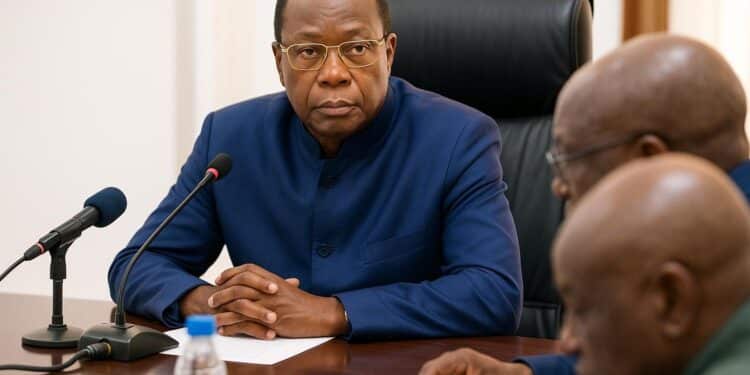Historic Agreements on Stadium Use
At FECOFOOT headquarters on 22 August 2025, executive committee members reviewed the continuing closure of the nation’s three largest football arenas. Their communique, later provided to local press, expressed “astonishment” that stadium gates remain locked despite prior agreements with the Ministry of Sports.
The federation cites a 2014 service note and a 2016 declaration granting it twenty-year user rights over Alphonse-Massamba-Débat in Brazzaville, the Municipal ground in Pointe-Noire and Paul-Sayal-Moukila in Dolisie. Those documents emerged when FIFA financed artificial turf installations worth three million dollars (FIFA reports).
Officials in the sports ministry stress that any concession is contingent on compliance with updated continental safety protocols issued by CAF in 2022 after crowd incidents in Africa (CAF circular, February 2022). They insist the closure reflects a “people-first approach,” not an institutional standoff.
Safety, Renovation, and Administrative Prudence
Government engineers completed audits in June that flagged drainage flaws beneath Brazzaville’s main pitch, corroded electrical cables in Pointe-Noire and an outdated fire-suppression system in Dolisie. These findings, confirmed by an independent contractor from Morocco’s Dizafrim Group, underpin the continued lockout, officials told Télé Congo.
Replacing sub-surface pipes alone could cost the treasury up to CFA 1.8 billion, according to an internal memo reviewed by Agence d’Information d’Afrique Centrale. Budget committees must reconcile this figure with spending priorities in health and education, sharpening policy makers’ caution about reopening.
FECOFOOT contends remedial works can be phased without halting domestic leagues. “Partial tribune closures would meet CAF standards and keep players active,” argues federation president Jean-Guy Blaise Mayolas. The ministry, while welcoming the suggestion, seeks written assurance from CAF inspectors before altering its stance, sources indicate.
Strategic Timeline Toward 2026 Qualifiers
Closure gains urgency because Congo’s senior men are scheduled to host South Sudan in November for the second round of 2026 World Cup qualifying. FECOFOOT currently courts neighboring Cameroon and Gabon as fallback venues, but relocation would inflate logistics costs by an estimated 34 percent.
CAF rules allow neutral-ground fixtures, yet analysts warn of competitive disadvantages. “Home crowds are intangible energy,” notes sports economist Dr. Sandrine Goma at Marien-Ngouabi University. She estimates gate receipts lost from one relocated qualifier could equal an entire season’s youth-development budget.
Womens and youth sides face similar dilemmas. Under-20 women must open their World Cup campaign in October, while the under-17 boys await UNIFFAC qualifiers. FECOFOOT pledges full participation, echoing government rhetoric that sport remains a pillar of national cohesion. Both parties portray dialogue as inevitable.
Governance Adjustments Within FECOFOOT
Beyond infrastructure, the executive committee filled two vacant seats, nominating Eudes Eric Mouandhalt and Hyppolite Okondzi Kongolo. The appointments, pending ratification by the general assembly, aim to fortify administrative bandwidth ahead of a crowded competitive calendar, insiders say.
Statutory compliance remains high on FIFA’s oversight list after the 2023 leadership dispute that briefly split the federation. An appellate court ruling in Brazzaville eventually reinstated the current board, prompting FIFA to lift its temporary warning letter in January 2024 (FIFA governance bulletin).
By stabilizing its board, FECOFOOT hopes to simplify correspondence with ministries and international partners. The federation is also digitizing club licensing in line with a CAF-mandated management system rolling across Africa. Linafoot and Linaff officials plan to pilot electronic ID cards for executives next season.
Domestic Leagues and Economic Ripple Effects
The hiatus of Ligue 1 and Ligue 2 matches impacts more than competitiveness. Vendors, transport operators and hotel managers around stadiums report revenue dips of 25 percent compared with the same quarter last year, according to the Pointe-Noire Chamber of Commerce.
At the same time, television numbers on Télé Congo’s weekend replays of foreign leagues have spiked. Some advertisers welcome the shift, suggesting the ecosystem is adapting rather than collapsing. Yet youth academies across Brazzaville caution that prolonged inactivity could drive prospects toward neighboring markets.
Economists at the Central Bank of Central African States nevertheless project the sector will rebound swiftly once fixtures return, citing precedent from the post-pandemic restart in 2021. They highlight the government’s record of channeling sport-related spending into wider infrastructure upgrades.
Regional Diplomacy Through Sport
For President Denis Sassou Nguesso, whose administration often leverages soft-power initiatives, a vibrant football calendar supports broader regional engagement. Congo hosted the All-Africa Games in 2015 and mediated CAF caucuses in 2022. Restoring stadium access would complement these diplomatic credentials, senior advisers argue.
Negotiators from FECOFOOT and the sports ministry plan another joint inspection tour in early September. Both sides publicly emphasize collaboration over confrontation, framing the issue as a technical hurdle rather than political deadlock. Observers expect a phased reopening blueprint to emerge before year’s end.












































